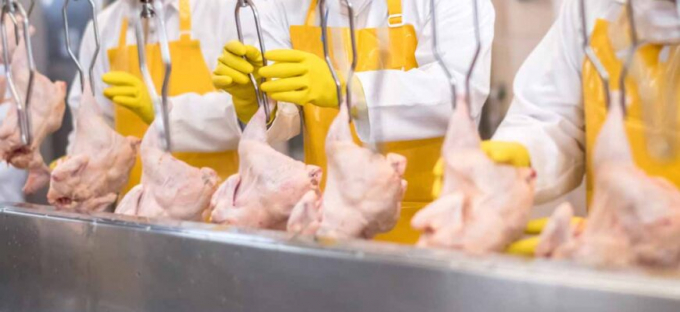June 8, 2025 | 05:51 GMT +7
June 8, 2025 | 05:51 GMT +7
Hotline: 0913.378.918
June 8, 2025 | 05:51 GMT +7
Hotline: 0913.378.918

Food is the source for most of those illnesses. The CDC says approximately one in every 25 packages of chicken sold at grocery stores contains salmonella bacteria.
The proposed U.S. Department of Agriculture rules would declare salmonella an adulterant — a contaminant that can cause food-borne illness — in breaded and stuffed raw chicken products. That includes many frozen foods found in grocery stores, including chicken cordon bleu and chicken Kyiv products that appear to be cooked through but are only heat-treated to set the batter or breading.
The agency notified producers of the proposed changes on Friday. USDA Deputy Under Secretary for Food Safety Sandra Eskin said it marks the beginning of a broader agency effort to curtail illnesses caused by the salmonella bacteria, which sickens 1.3 million Americans each year. It sends more than 26,000 of them to hospitals and causes 420 deaths, according to Centers for Disease Control and Prevention data.
Food is the source for most of those illnesses. The CDC says approximately one in every 25 packages of chicken sold at grocery stores contains salmonella bacteria.
Since 1998, breaded and stuffed raw chicken products have been associated with 14 salmonella outbreaks and approximately 200 illnesses, the USDA said in a statement. An outbreak last year tied to frozen breaded raw chicken products caused 36 illnesses in 11 states and sent 12 people to hospitals.
Better testing
The USDA has performance standards that poultry processing plants have to meet to reduce contamination, but the agency cannot stop products from being sold. There is also no adequate testing system to determine levels of salmonella in meat, Eskin said.
The proposed new rules require routine testing at chicken processing plants. Products would be considered adulterated when they exceed a very low level of salmonella contamination and would be subject to regulatory action, including shuttering plants that fail to reduce salmonella bacteria levels in their products, Eskin said.
"This action and our overall salmonella initiative underscore our view that our job is to ensure that consumers don't get sick from meat and poultry products," she said. "They shouldn't be sold if they're contaminated to the degree that people get sick."
In 1994, the USDA's Food Safety and Inspection Service took a similar step by declaring some strains of E. coli a contaminant in ground beef and launched a testing program for the pathogen.
Eskin said the agency met with food safety experts and poultry processors for ideas on how to reduce contamination in processing.
Representatives of the National Chicken Council, a trade group, and Tyson Foods said they would withhold comment until they received details of the new USDA rule.
Diana Souder, a spokeswoman for Maryland-based Perdue Farms, also declined to comment but pointed out that the company belongs to the Coalition for Poultry Safety Reform, a group formed last year to work with USDA and others to reduce foodborne illnesses from salmonella contamination.
The new rules will be published in the Federal Register this fall and the USDA's Food Safety and Inspection Service will seek public comment before finalizing the rules and setting a date for implementation.
(cbsnews)

(VAN) With the war ongoing, many Ukrainian farmers and rural farming families face limited access to their land due to mines and lack the financial resources to purchase needed agricultural inputs.

(VAN) Vikas Rambal has quietly built a $5 billion business empire in manufacturing, property and solar, and catapulted onto the Rich List.

(VAN) Available cropland now at less than five percent, according to latest geospatial assessment from FAO and UNOSAT.

(VAN) Alt Carbon has raised $12 million in a seed round as it plans to scale its carbon dioxide removal work in the South Asian nation.

(VAN) Attempts to bring down the price of the Japanese staple have had little effect amid a cost-of-living crisis.

(VAN) Fourth most important food crop in peril as Latin America and Caribbean suffer from slow-onset climate disaster.

(VAN) Shifting market dynamics and the noise around new legislation has propelled Trouw Nutrition’s research around early life nutrition in poultry. Today, it continues to be a key area of research.